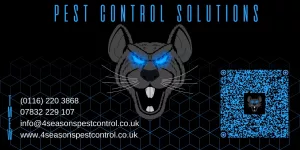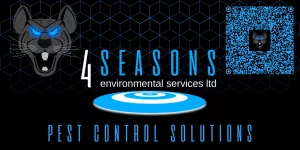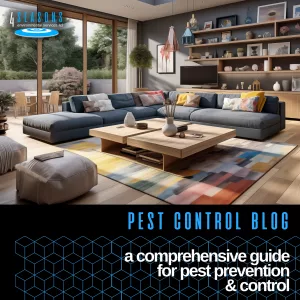Pest Prevention and Pest Control
A Comprehensive Guide to Pest Control
by 4 Seasons Environmental Services
07 February 2024
Introduction
The presence of pests in homes can be a persistent concern, with potential invaders ranging from common ants and mice to more elusive bed bugs and moths. The key to a pest-free home lies not only in effective eradication but, more importantly, in comprehensive prevention strategies. This guide delves into the nuances of keeping your home pest-free, providing detailed insights into the prevention of common pests and effective measures to eradicate them if an infestation occurs.
Preventing Pest Infestations
General Hygiene Practices
A clean home not only provides comfort but also acts as a deterrent to pests. Beyond the aesthetics, maintaining cleanliness is a fundamental aspect of pest prevention. Regularly vacuuming, sweeping, and mopping floors eliminate crumbs and spills that can attract pests. Furthermore, decluttering spaces removes potential hiding spots, making it difficult for pests to establish a presence.
Sealing Entry Points
Pests often exploit the tiniest gaps and cracks to enter homes. By conducting a thorough inspection and sealing potential entry points, homeowners create a formidable barrier against unwanted invaders. This includes gaps around windows, doors, utility entry points, and any crevices in the walls that might serve as gateways for pests.
Outdoor Maintenance
The exterior of your home is often the first line of defence against pests. Trimming trees and bushes away from the house minimises the risk of pests finding their way indoors. Regularly cleaning gutters prevents water accumulation, which can attract pests. Additionally, storing firewood off the ground reduces harbourage areas for pests.
Regular Inspections
Vigilance is paramount in pest prevention. Conducting routine inspections of your property helps in early detection, enabling you to address potential issues before they escalate. Be thorough in your examination, looking for signs such as droppings, nests, or gnaw marks that could indicate the presence of pests.
Proper Waste Management
Proper waste management is a simple yet effective way to deter pests. Secure bins with tight-fitting lids prevent pests from accessing food waste. Avoid leaving pet food outside overnight, and ensure that all garbage is disposed of regularly.
Pet Care
Pets can inadvertently bring pests into your home. Regular grooming and treatment for fleas and ticks are essential preventive measures. Keeping pet areas clean and washing their bedding frequently reduces the likelihood of pests finding a home in these spaces.
Professional Inspections by Pest Control Technicians
While self-inspections are valuable, scheduling regular professional inspections with pest control services provides an expert’s perspective. Professionals can identify potential vulnerabilities and offer insights into preventive measures, ensuring a proactive approach to pest management.
Dealing with Pests – Ants, Rodents – Mice & Rats, Squirrels, Lice, Fleas, Bedbugs, Moths, Beetles, Cockroaches, Wasp & Bees
Ant Prevention & Eradication
Prevention: Ants are attracted to food sources, especially sweets and greasy substances. Keep surfaces clean, wipe up spills promptly, and use ant deterrents around potential entry points. Seal entry points with caulk.
Eradication: If an infestation occurs, ant baits and gels are effective. Locate and eliminate ant nests, and consider seeking professional help for persistent infestations.
Mice and Rats Prevention & Eradication
Prevention: Seal entry points with steel wool or caulk, store food in rodent-proof containers, and keep areas around the property free of debris.
Eradication: Traps can be strategically placed, and entry points should be sealed after removal. Seek professional help for large infestations.
Squirrels Prevention & Eradication
Prevention: Trimming tree branches near the property, using squirrel-proof bird feeders, and sealing entry points in attics and crawl spaces are preventive measures.
Eradication: Use humane traps for removal and seal entry points after removal. Seek professional help if necessary.
Lice and Fleas Prevention & Eradication
Prevention: Regular grooming and treating pets for fleas and ticks, along with cleaning and vacuuming, are preventive measures.
Eradication: Wash bedding and pet items, vacuum thoroughly, and use appropriate pest control products for eradication.
Bed Bugs Prevention & Eradication
Prevention: Inspect used furniture before bringing it home, regularly wash bedding, and use bed bug-proof mattress covers.
Eradication: Wash bedding and clothing in hot water, vacuum thoroughly, and seek professional help for extensive infestations.
Moths and Beetles Prevention & Eradication
Prevention: Proper storage of clothes, regular cleaning of closets, and the use of repellents are preventive measures.
Eradication: Wash infested items, use pheromone traps, and seek professional help for severe cases.
Cockroaches Prevention & Eradication
Prevention: Maintaining a clean kitchen, sealing entry points, and eliminating standing water are preventive measures.
Eradication: Use cockroach baits and traps, keep food tightly sealed, and seek professional help for severe infestations.
Wasps and Bees Prevention & Eradication
Prevention: Regularly inspect eaves and overhangs, seal entry points, and remove outdoor food sources.
Eradication: Use wasp and bee spray cautiously, hire professionals for nest removal, and install wasp traps in outdoor areas.
Additional Tips
Educate Yourself
Understanding the specific pests you might encounter is crucial. Each pest has unique habits, life cycles, and preferences. Knowledge is your first line of defence.
Natural Remedies
Consider natural methods for pest control, such as essential oils or diatomaceous earth. These methods can be effective and have fewer environmental impacts compared to chemical alternatives.
Stay Informed
Pest patterns can vary seasonally, and new control methods continually emerge. Staying informed allows you to adapt your prevention and control strategies accordingly.
Neighbourhood Cooperation
Pests don’t adhere to property lines. Working collaboratively with neighbours to address shared pest concerns enhances the overall defence against infestations. Sharing information about successful prevention methods can create a more pest-resistant community.
Conclusion
By implementing these comprehensive strategies, you not only reduce the risk of pest infestations but also create an environment where pests are less likely to thrive. Prevention is an ongoing process that involves a combination of good hygiene practices, sealing entry points, and addressing specific concerns related to the type of pest. Regular diligence and proactive measures are key to maintaining a pest-free living environment. Always remember, early detection and prevention are your best tools in the fight against pests. Please contact us if you have a heavy pest infestation and you would like us to come in and manage your pest control needs.

© Copyright 2024 by 4 Seasons Environmental Services. All Rights Reserved.









